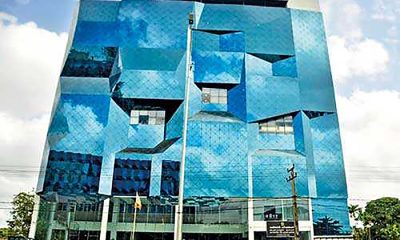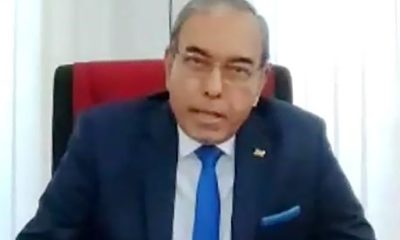Editorial
Mutton and gluttons

Monday 24th April, 2023
‘The Land of Cockaigne’, the English translation of a 13th Century French poem, tells us about an imaginary land of plenty, where houses are made of cake and other such delicious food items; rivers of milk are flowing and everything is available free of charge. But on reading recent news items in the local media, one wonders whether ‘Cockaigne’ is real and found on a manmade eyot in the Diyawanna Lake.
Sri Lanka is facing the worst-ever economic crisis, and the people are undergoing untold hardships. But the elected are free from such trouble; in fact, they are living high on the hog. They and their kith and kin move about in super luxury vehicles, junket and occupy palatial houses that fit Coleridge’s description of Kubla Khan’s Xanadu. Besides, there is no end to the expansion of their bulging waistlines, a sign of gluttony.
Parliament has decided to stop serving mutton in its restaurants, according to some media reports. We are not in a position to vouch for the veracity of these news items. If they are not true, Parliament should issue a denial fast. Otherwise, one should not be faulted for concluding that the MPs have been relishing subsidised mutton, among other delicacies, at Parliament, while the ordinary people are struggling to dull the pangs of hunger, or keep the wolf from the door. Mutton is so expensive in this country that it has become a luxury that only the super-rich, politicians included, can afford. The public cannot consume even eggs, whose prices are soaring.
A survey conducted by the Hector Kobbekaduwa Agrarian Research and Training Institute has revealed that due to the crippling economic crisis and the resultant increase in food inflation, the ordinary public has cut down on the consumption of food items such as beans, carrot, brinjal and leafy vegetables, and the demand for relatively affordable kohila has been increasing. The survey report, titled, “Economic Crisis and Household Food Security in Sri Lanka – 2022,” paints a bleak picture of the food situation in the country, as we reported three weeks ago. It says many people have opted to consume fewer food items or skip meals or reduce the amount of victuals.
One may recall that, in the late 1980s, the JVP coined a pithy slogan to mobilise the rural youth by highlighting the high life which the urban elite used to live at the expense of their less fortunate counterparts elsewhere—kolombata kiri, gamata kekiri (‘milk for Colombo and melon for village’). Curiously, the Reds in the House at present have not raised any objections to expensive meat reportedly being served at subsidised prices in the Parliament canteen while the people are being urged to tighten their belts for the sake of the country. Will they come up with something like ‘unta elu mas, apita kohila’—’mutton for them and kohila for us’?
It has been quite a struggle for even middle-class citizens to make ends meet. Professionals who were lucky enough to enjoy some middle-class comforts earlier are also experiencing pecuniary woes now; they are up in arms, unable to pay extremely high taxes and loan installments. They are leaving the country in droves to prevent themselves from being reduced to penury. The government does not seem to give a tinker’s cuss about the unprecedented human capital flight, which has taken a heavy toll on many institutions, especially the state-run hospitals. Even fresh medical graduates are leaving the country, we are told. Malnutrition is rampant among children, some of whom faint in schools. It defies comprehension why heavily subsidised meals should be made available to the elected while the electors are experiencing all kinds of shortages and deprivations and skipping meals.
It is only natural that some professionals migrate and others protest when they see politicians, who are not eligible to secure employment in the state sector even as labourers, living like Citizen Kane. Here is the meat of the matter: public anger is welling up and anti-politics is on the rise. Unless the elected stop getting the electors’ goat, they will be in shtook. They will have to do much more than stopping the consumption of subsidised mutton. They must adopt the same austerity measures as the public. Pork barrel politics won’t do.
Editorial
Flawed drug regulation endangers lives

Thursday 18th December, 2025
Serious concerns raised by Sri Lankan medical professionals over the quality of some batches of the Ondansetron injection, manufactured by Maan Pharmaceuticals, Ltd., India, and the subsequent withdrawal of them from hospitals here, have shed light on a bigger issue. The use of nine other parenteral products has been suspended with immediate effect, according to media reports. They will be subjected to quality assessment, the National Medicines Regulatory Authority (NMRA) has said.
Spokesman for the Government Medical Officers Association (GMOA) Dr. Chamil Wijesinghe has stressed the need for thorough tests on Ondansetron. He has told the media that the NMRA is responsible for testing imported pharmaceuticals for quality. However, Health Minister Dr. Nalinda Jayatissa has told the media during the weekly post-Cabinet media that not all drugs imported by Sri Lanka are tested by the NMRA for quality, as it lacks laboratory facilities to do so, and drugs are tested rigorously only if there are complaints of adverse reactions. Is it that the NMRA goes by what pharmaceutical companies say about their products when it approves medicines? The present-day politicians and the health panjandrums have not learnt from the procurement of fake cancer drugs during the previous regime.
Minister Dr. Jayatissa has sought to give the drug controversy a political twist. He has said Ondansetron manufactured by Maan was approved for five years, in 2022, the implication being that the previous government was responsible for the registration of the drug. He hastened to add that proper procedures had been followed in procuring it. Interestingly, among the four batches of Ondansetron found to be contaminated, two were imported under the current dispensation! The NPP government has passed laws to deprive the former Presidents of their retirement entitlements and evict them from their official residences, and it came to power, promising to renegotiate the IMF agreement. So, cancelling the registration of any drug that does not meet stipulated standards should be child’s play for the powerful NPP administration.
On the question of quality issues concerning Indian drugs, it is worth recalling that in the late 1980s, the JVP assassinated Chairperson of the State Pharmaceutical Corporation Dr. (Mrs) Gladys Jayewardene for importing drugs from India, which the JVP likened to a giant octopus spreading its tentacles over Sri Lanka. About three and a half decades on, the JVP-led NPP government has gone to the extent of recognising the Indian Pharmacopoeia amidst protests from Sri Lankan medical professionals!
Dr. Chamal Sanjeewa, who leads the Doctors’ Trade Union Alliance for Medical Civil Rights, has said more than 100 batches of medicines imported from India have been withdrawn during the past two years or so due to concerns about their quality. Flaying the Health Ministry, the NMRA, and State Pharmaceutical Corporation for serious flaws in drug regulation, he has called for the resignation of the top officials responsible for ensuring the quality of imported medicines. Health Minister Dr. Jayatissa should also resign as he has retained the officials responsible for the registration of substandard and falsified drugs in the past, Dr. Sanjeewa has said. The most serious issue, in our book, is that the NMRA is without adequate laboratory facilities to conduct stringent quality tests on all medicines it approves, and apparently takes leaps of faith, leaving patients at risk. Successive governments have paid lip service to the need for state-of-the-art labs to test medicines and ensure that they meet international standards. The NMRA must be fully equipped to test all drugs properly before they are approved, and no room must be left for the import of substandard and falsified medicines.
According to the World Health Organization (WHO), at least one in 10 medical products in low-and middle-income countries fails to meet quality standards or is falsified. This shows the enormity of the problem of falsified and substandard drugs. Quality failures of pharmaceuticals not only harm patients directly but also impose large economic burdens on individuals and health systems, including wasted resources on ineffective treatments and costs related to managing adverse effects, WHO has pointed out. The need for a thorough investigation to find out why the NMRA approved the aforesaid drugs cannot be overstated.
Editorial
Colombo Port facing strategic neglect

Wednesday 17th December, 2025
The Colombo Port is always in the news for the wrong reasons. More than 300 container trucks loaded with cargo are waiting within its premises due to a clearance delay, according to a report we published yesterday. The Container Transport Vehicle Owners’ Association has urged the government to take action to eliminate the port delays forthwith. It has warned that there will be a shortage of essential commodities soon if delays persist. Additional expenditure incurred by the truck operators due to port delays will be passed on to the public, the association has said. One of the reasons for these delays is said to be the inflow of disaster relief materials that need to be cleared on a priority basis. However, the Colombo Port experiences delays even when there is no influx of disaster relief.
Port delays take a heavy toll on exports as well. As we have pointed out in a previous comment, quoting a former Navy officer, the Coast Guard personnel are qualified to handle Customs operations and they can be called in to help ease port congestion. The government should seriously consider doing so.
In January 2025, protracted delays in the Colombo Port jolted the government into purportedly devising ways and means of doing away with them. But the problem is far from over. The government made use of the delays to have 323 red-flagged containers released via the green channel without Customs checks. The possibility of racketeers making the most of the current situation to have containers carrying contraband green-channelled cannot be ruled out. The Opposition, the media, trade unions and port workers must remain vigilant to thwart such a move.
Delays drive away major shipping lines. It has been reported that several international shipping lines have opted to bypass the Colombo Port, which is facing escalating congestion due to various factors related mainly to capacity and efficiency.
What the NPP government and the top port officials must realise is that the Colombo Port is not the only girl on the beach, as it were. India’s newly built Vizhinjam port is becoming a major attraction for international shippers who are averse to delays. In global logistics, shipping lines place very high value on on-time delivery, reliability and efficient operations.
Vizhinjam poses numerous challenges to the Colombo Port. The government must take cognisance of this reality and make a serious effort to enhance the efficiency and capacity of the Colombo Port to retain the transhipment traffic historically routed via Colombo. There is a strong possibility of shipping lines rerouting feeder services away from Colombo to Vizhinjam, adversely impacting Colombo’s network role, as shipping experts have warned.
Vizhinjam has several key advantages over Colombo. It advertises itself as a deep-water port with a 24 m natural draft, which enables it to accommodate ultra-large container vessels without dredging; its proximity to the main east–west shipping route helps vessels to call without significant deviation, reducing voyage time and costs. Automation, modern cranes, faster turnaround times, enhanced operational efficiency and attractiveness to shipping lines are other advantages India’s new port has over Colombo.
Experts have urged Sri Lanka to adopt a viable mitigation strategy to face competition from Vizhinjam effectively. The Colombo Port has to enhance its efficiency, cost proposition, capacity, and service differentiation, while strengthening its role as a comprehensive logistics and maritime hub rather than a pure transshipment stop, they have pointed out. Sadly, successive governments have ignored expert opinion and done precious little to retain the Colombo Port’s competitiveness, much less prepare it to face future challenges. They have only adopted piecemeal remedies and, worse, turned the premier port into a playground for rival global powers.
The incumbent government has failed to make a difference despite its rhetoric. If strategic modernisation and operational improvements are not effected to the Colombo Port urgently to enable it to eliminate delays and enhance its efficiency and the quality of its service significantly-à-vis the emerging rival facilities in the region, it will run the risk of diminishing its relevance.
Editorial
Bondi Beach and Arugam Bay

Tuesday 16th December, 2025
It was with shock and dismay that the world received the news about Sunday’s cowardly terror attack on a group of Israelis in Australia. Sixteen lives were lost and about 40 others injured in the Bondi Beach mass shooting, which followed an increase in anti-Jewish incidents in Australia after Israel’s invasion of Gaza, where 70,000 Palestinians have perished at the hands of the Israeli military.
Israel has doubtlessly made Hamas regret its 2023 incursion, indiscriminate killings and mass hostage-taking. But the Netanyahu government has incurred much international opprobrium by unleashing disproportionate violence and carrying out attacks on civilian targets. Worse, the Bondi Beach attack has demonstrated the growing vulnerability of Israeli citizens overseas.
Hamas has had to agree to a ceasefire, and faces the prospect of having to disarm. Israel may obliterate Gaza, but victory will still elude it. Hamas may carry out more attacks on Israel, and its sympathisers may target Israeli civilians, but Palestinians will not benefit from such acts of violence. Only peace will benefit the warring sides and civilians. The problem is best tackled at source.
The need of the hour is for the world to strengthen the Gaza ceasefire and make it work by ensuring that both sides refrain from violating it. That is what US President Donald Trump was expected to do. Last month, the United Nations Security Council adopted a US-sponsored resolution that enshrined Trump’s 20-point plan, including the mandate to set up a multinational force for Gaza, but not a single nation has formally committed troops to it yet, according to media reports.
Unfortunately, instead of intensifying his focus on resolving the Gaza conflict and other disputes in keeping with his pre-election pledges, President Trump appears to be busy enacting scenes from Pirates of the Caribbean, hijacking ships and sinking boats off Venezuela, while eying the Nobel Peace Prize, of all things.
Meanwhile, Sri Lanka must keep its guard up. There are Israeli tourists here. In October 2024, the US embassy, followed up by Sri Lankan police and Israel’s National security council, warned of serious terrorist threats to Israelis holidaying in the Arugam Bay area. Thankfully, what was feared did not come to pass, but no room must be left for complacency.
Sri Lanka must take the Bondi Beach attack as a warning and brace itself for any eventuality. A terror attack on its soil is something it needs like a hole in the head while struggling to manage the impact of a natural disaster and keep the economy on track.
The economic cost of the Ditwah disaster has not yet been calculated, but Commissioner General of Essential Services Prabath Chandrakeerthi has given a ballpark figure—USD 6 -7 billion or about 3 – 5 percent of GDP. This is a staggering amount. The economic crisis is far from over. The government has its work cut out to allocate funds for rebuilding programmes and is therefore seeking assistance from other nations. But whether foreign aid will be sufficient for the post-disaster reconstruction projects in all 25 districts, affected by Ditwah, remains to be seen, as we argued in a previous comment. The country is therefore heavily dependent on tourism to shore up its foreign currency reserves. One may recall that the 2019 Easter Terror attacks crippled the tourism sector, and contributed to the forex crisis by depriving the economy of billions of dollars a year.
Sri Lanka cannot take any more shocks, and everything possible must be done to neutralise threats to its national security and prevent it from suffering the same fate as the proverbial man who was gored by a bull after falling from a tree.
-

 Features5 days ago
Features5 days agoWhy Sri Lanka Still Has No Doppler Radar – and Who Should Be Held Accountable
-

 Features7 days ago
Features7 days agoDitwah: A Country Tested, A People United
-

 News15 hours ago
News15 hours agoPakistan hands over 200 tonnes of humanitarian aid to Lanka
-

 News7 days ago
News7 days agoRs 1. 3 bn yahapalana building deal under investigation
-

 News15 hours ago
News15 hours agoPope fires broadside: ‘The Holy See won’t be a silent bystander to the grave disparities, injustices, and fundamental human rights violations’
-

 Business7 days ago
Business7 days agoFluctuating fortunes for bourse in the wake of selling pressure
-

 Opinion7 days ago
Opinion7 days agoComfort for some, death for others: The reality of climate change
-

 News7 days ago
News7 days agoFormer SAARC SG Esala Weerakoon calls for ‘South Asian Climate Compact’













